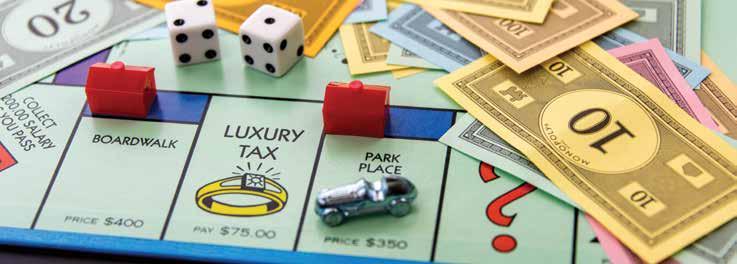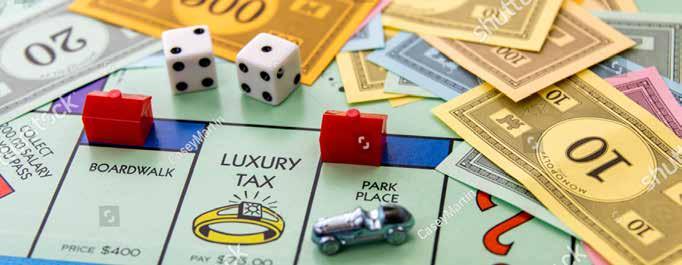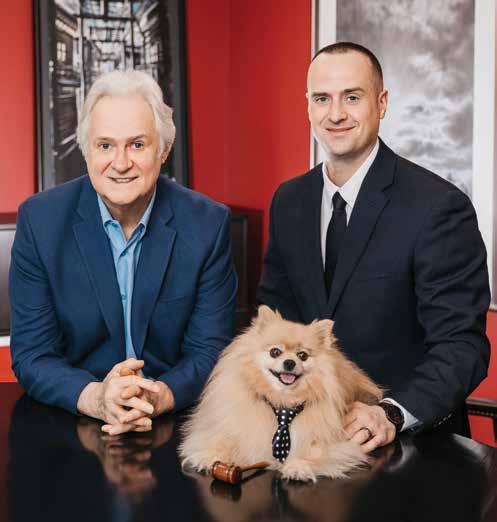
7 minute read
Luxury Tax

CaseyMartin / Shutterstock.com
As a child I loved playing Monopoly— with its stacks of brightly coloured bills and tiny green houses and red hotels you could “build” while on your way to amassing wealth.
The rent from a couple of strategically placed hotels on the highly coveted Boardwalk and Park Place could mean game-over for an unwitting guest. But with a lucky roll of the dice, you could avoid demise by taking safe haven on an innocuous space nestled between the two: “Luxury Tax.” In those formative years, I wondered what Luxury Tax meant.
As of September 1, 2022, the term “luxury tax” has taken on a whole new meaning for Canadians: The Federal Government surreptitiously introduced a new luxury tax in the 2022 Federal Budget. Known properly as the Select Luxury Items Tax, it is an additional tax on the sale or importation of certain vehicles and aircraft priced above $100,000, and certain boats priced over $250,000.
Generally speaking, applicability of the luxury tax is the same for aircraft, boats, and vehicles. It’s fair to say, however, that it will be disproportionately applied to vehicles, so that is where I will focus my discussion in this article.
Subject Vehicles
Subject to limited exceptions, the luxury tax is applicable to any vehicle priced above $100,000 that meets the definition of a “subject vehicle,” be it a sedan, coupe, hatchback, convertible, SUV, or pick-up truck.
A subject vehicle is defined as any motor vehicle that • is designed or adapted primarily to carry individuals on highways and streets; • has seating capacity for not more than 10 individuals; • has a gross vehicle weight rating of 3,856 kg or less; • was manufactured after 2018; and • is designed to travel with four or more wheels in contact with the ground.
Liability for Tax
The luxury tax applies to subject vehicles purchased in or imported to Canada, as well as leases and some improvements made to subject vehicles.
In most cases, the luxury tax will not apply to subject vehicles that have been previously registered with the Government of Canada or a province (for the purposes of permitting that subject vehicle to travel on public roads).
In other words, unlike the BC Provincial Sales Tax (12 per cent on used vehicles), the luxury tax does not apply to used vehicles purchased within Canada. It does, however, apply to imported used subject vehicles that have not been previously registered in Canada.
The luxury tax also applies to agreements to lease or licence use of a subject vehicle (or any other such similar arrangement) valued above the price threshold, if that subject vehicle has not been previously registered with the Government of Canada or a province.
Jeremy Andersen
Said differently, the luxury tax applies to new (and some used) subject vehicles if the risks and rewards of ownership are transferred by any form of agreement from a registered vendor of subject vehicles to a consumer.
Improvements made to subject vehicles within 1 year of the sale date, and that exceed $5,000, can also trigger the luxury tax. The cost to acquire and install items such as stereo systems, body kits, engine upgrades, vehicle wrap, and window tint would be considered improvements.
The costs of cleaning, repairs and maintenance, and modifications for the purposes of child safety or to enhance accessibility for persons with disabilities would generally not be considered improvements for the purposes of the luxury tax.
As with all consumption taxes, the vendor must collect the tax on behalf of the Minister of National Revenue and remit it to the CRA. Simply put, in most cases the onus will be on dealerships to collect and remit the tax.
Calculating the Luxury Tax
Generally, the luxury tax is calculated as the lesser of • 10% of the taxable amount of the subject vehicle, and • 20% of the amount above the price threshold. Determining the taxable amount of a subject vehicle for calculating the luxury tax payable depends on the circumstances.
The taxable amount is generally calculated as the sum of • the value of the consideration for the sale of the subject vehicle; and • the value of the consideration for any improvements made by
the vendor to the subject vehicle in connection with the sale that are not included in the above. Note: For that purpose, the consideration includes cash and any in-kind consideration, such as trade-ins.
For imported subject vehicles, the taxable amount is calculated as the sum of • the value of the subject vehicle as determined under the
Customs Act, and • the total amount of any duties and taxes (other than the GST/
HST) that is payable on the subject vehicle under the
Customs Tariff, the Excise
Tax Act, the Special Import
Measures Act, and any other law relating to customs. For leased vehicles, the taxable amount is the greater of • the retail value—fair market value, plus shipping, taxes, levies, and all other fees of the subject vehicle at the time possession of the subject vehicle is first transferred to the lessee under the lease (or other such similar arrangement); and • the retail value of the subject vehicle at the time the lessee first has the right to use the subject vehicle under the agreement. Let’s say a subject vehicle is sold to a consumer who pays $100,000 cash and provides a trade-in valued at $50,000. In that scenario the total consideration is $150,000, which is also the taxable amount. The luxury tax would be calculated as the lesser of • $15,000 ($150,000 x 10%) • $10,000 (($150,000 − $100,000) x 20%)
Who Will See Your Ad in The Scrivener?
BC Notaries Lawyers Land Surveyors of BC Real Estate Professionals Real Estate Boards and Associations Age-Friendly Designates MLAs and MPs in BC Life Insurance Brokers and Agents Accountants Managers of Financial Institutions Investment Management Agencies Provincial and Federal Court Judges Registrars Mayors Government Ministries of Libraries: Public and Private, including Law Society, Legal Services, Education Facilities Chambers of Commerce BC Housing BC Assessment Ministry of Citizens’ Services: Real Property Division
Spring/Summer Advertising Space Deadline February 22, 2023
scrivener@bcnotaryassociation.ca www.bcnotaryassociation.ca
“We’ve ensured our legal and health care wishes will be carried out, should either of us become incapacitated or pass away. Our loved ones will not be burdened by the stress of making our decisions for us.”
FOUR IMPORTANT PERSONAL PLANNING DOCUMENTS
Will Representation Agreement Advance Health Care Directive Power of Attorney Give the gift of advance planning to your loved ones. Call your BC Notary today.
©iStockphoto.com/Circle Creative Studio www.bcnotaryassociation.ca (604) 676-8570

Trevor, Jackson and Chuck E. Todd providing excellent legal services in contested wills, trusts and estates for over 50 years.
disinherited.com
rttodd@disinherited.com | t. 604.264.8470 Therefore, the luxury tax payable is $10,000.
Now let’s say the vendor of that same subject vehicle leases it to a consumer on December 1, 2022. Under the terms of the lease, the consumer has the right to use the subject vehicle starting at that time; possession of the subject vehicle, however, is not transferred to the lessee until January 2, 2023.
On December 1, 2022, the fair market value is $147,000, plus a freight fee of $2,000 and $1,000 in federal excise tax payable, making the retail value of the vehicle the same $150,000. By January 2, 2023, however, the retail value of the subject vehicle has decreased to $130,000.
The taxable amount of the subject vehicle is based on the retail value at December 1, that being the greater of the two amounts. The luxury tax then is calculated in the same manner as the first scenario, that is the lesser of the following. • $15,000 ($150,000 x 10%) • $10,000 (($150,000 − $100,000) × 20%) Therefore, the luxury tax payable is $10,000.
That is a simplified discussion and illustration of the applicability of the Select Luxury Items Tax as relates primarily to passenger vehicles. I have omitted many exceptions and specifics. Readers are encouraged to refer to the Select Luxury Items Tax Act (S.C. 2022, c. 10, section 135) for greater detail and clarity. s Jeremy Andersen is a Sooke Notary Public and CPA, CA with 20 years’ experience working in the public sector, private industry, and public practice.










